Key takeaways:
- Collaboration and understanding client needs are crucial in crafting engaging web development experiences.
- Learning React enhances productivity through its component-based architecture and is in high demand in the job market.
- Working on practical projects, such as apps and collaborating on open-source initiatives, solidifies understanding and builds real-world skills.
- Reflecting on challenges and progress fosters resilience and deeper learning in the development journey.
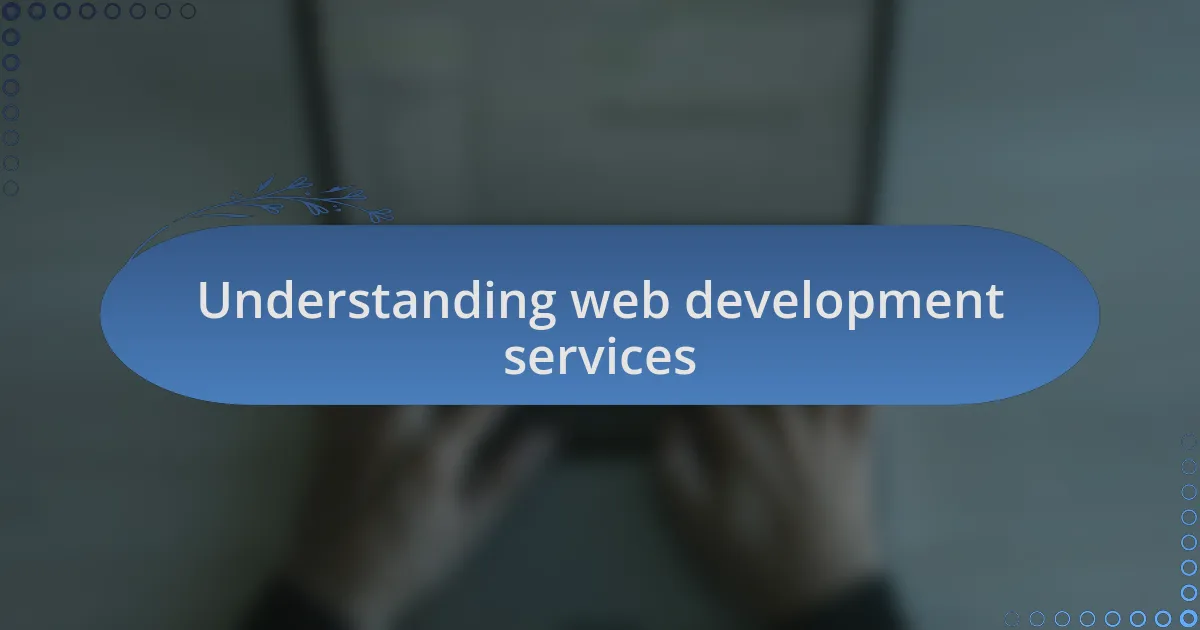
Understanding web development services
Web development services encompass a wide range of tasks aimed at creating and maintaining websites. I remember when I first navigated the complexities of this field; it was overwhelming yet fascinating. Each layer of development, from design to deployment, felt like solving a intricate puzzle that demanded creativity and technical skill.
When diving deeper into web development services, I realized the importance of understanding client needs. It’s not just about writing code; it’s about crafting an experience that resonates with users. Have you ever thought about what makes a website truly engaging? I learned that successful web development hinges on combining functionality with aesthetics, driving user satisfaction and retention.
Collaboration is another critical aspect I discovered. Working alongside designers, content creators, and clients fosters a deeper understanding of project goals. It was during a team project that I saw firsthand how diverse perspectives can elevate a website’s impact. How often do we underestimate the power of teamwork in crafting digital experiences? From my experience, embracing this collaborative spirit has been key to delivering successful web solutions.
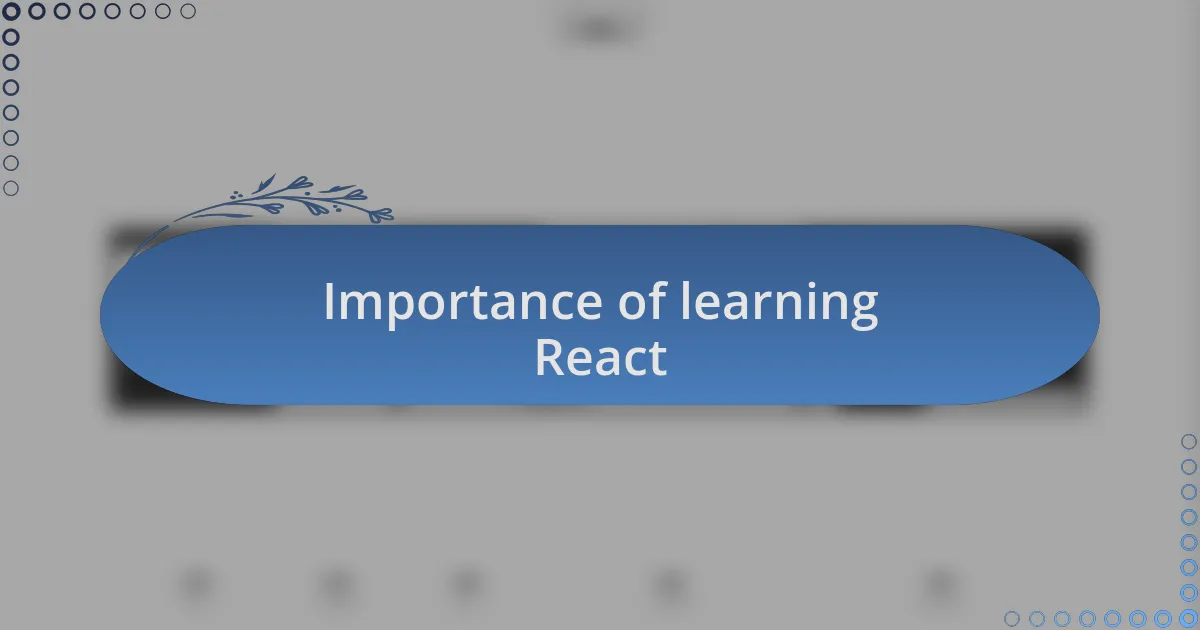
Importance of learning React
The significance of learning React lies in its ability to streamline the development process. I recall feeling an immediate sense of relief when I first grasped its component-based architecture. Suddenly, I could build reusable UI components that saved me time and effort, transforming what used to be a daunting task into an enjoyable creative experience. Isn’t that a game-changer for anyone looking to enhance their productivity?
Moreover, React’s popularity in the web development landscape cannot be overstated. When I began exploring job opportunities, I noticed a consistent demand for React skills across various industries. It hit me that mastering React not only expands my technical toolkit but also positions me strategically in the job market. Have you ever felt the thrill of knowing you have a skill that’s highly sought after? Learning React offers that sense of security and potential.
Finally, the vibrant community surrounding React is a treasure trove for learning. I still remember the late-night discussions in forums and the endless resources available—tutorials, libraries, and frameworks. Engaging with fellow developers not only deepened my understanding but also created connections that extended beyond coding. How often do we overlook the importance of community in our learning journeys? My experience shows that being part of a supportive network can lead to countless opportunities and insights.
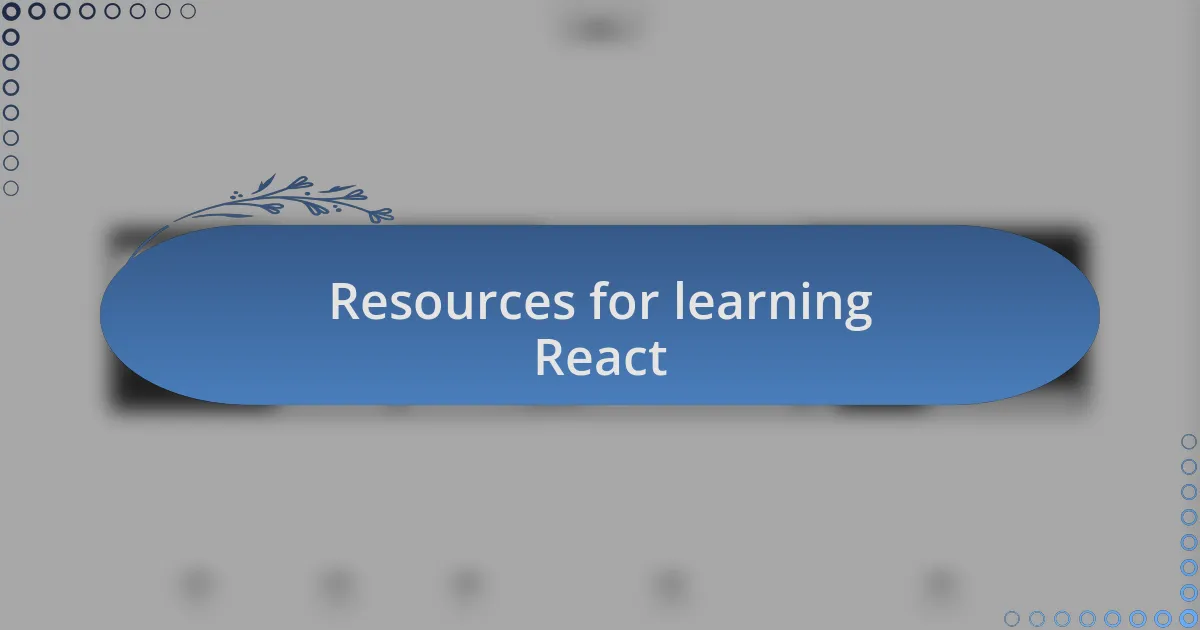
Resources for learning React
When I was embarking on my journey to learn React, I quickly discovered that the official documentation is a gold mine. I vividly remember spending hours dissecting example codes and tutorials. It felt like peeling back layers of a complex puzzle, transforming confusion into clarity. Have you ever had that moment where you finally understand something you thought was out of reach? The official docs really helped me bridge that gap, serving as a reliable reference point.
Beyond the official resources, online platforms like Codecademy and freeCodeCamp became my go-to learning tools. Each lesson felt like a small victory, especially when I completed my first hands-on project. I still recall the excitement when I successfully built a tiny app, feeling the thrill of creation and validation. How often do we find motivation in our progress? Those platforms not only provided structured learning but also fostered a sense of accomplishment.
YouTube tutorials also significantly contributed to my understanding of React. I found myself binge-watching series like Traversy Media and The Net Ninja, soaking up knowledge while engaged with passionate instructors. It’s fascinating how visual learning can spark inspiration—did you ever find yourself pausing a video, eager to try out a new feature? Those channels infused my learning experience with energy and real-world applications, making the often daunting concepts much more digestible.
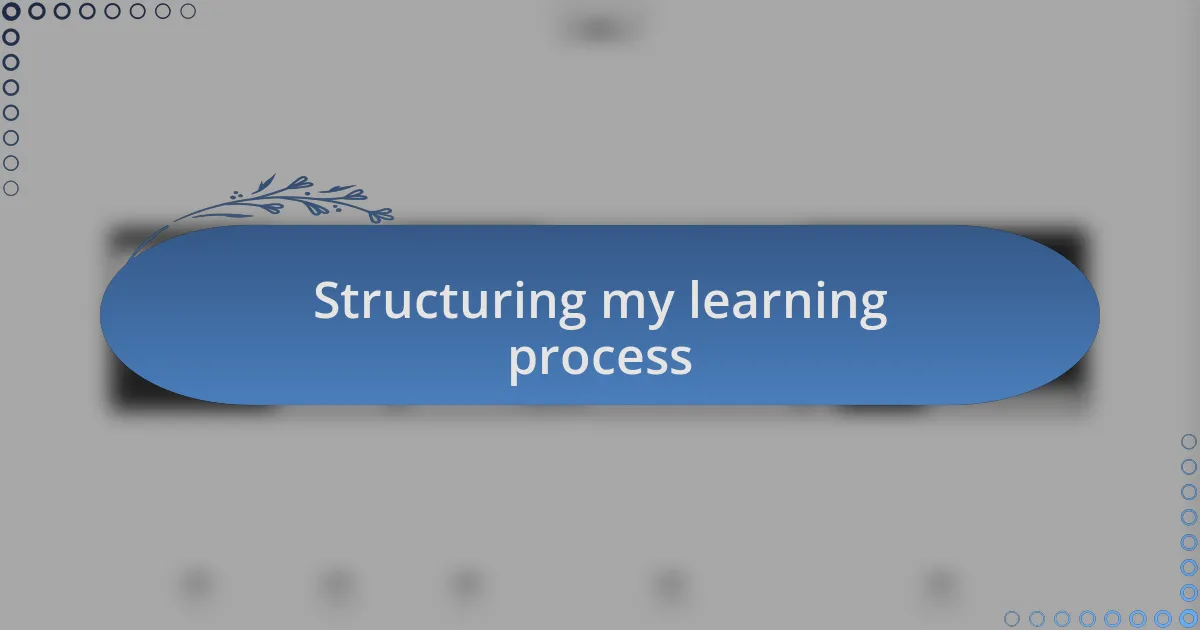
Structuring my learning process
When it came to structuring my learning process in React, I realized that setting clear goals was paramount. I began by outlining what I wanted to achieve: from mastering components to understanding hooks. This clarity not only steered my focus but also made the learning journey feel less overwhelming. Have you ever felt lost without a destination? Establishing those milestones helped me track my progress, motivating me to push forward.
I adopted a mix of theory and practice to keep my learning dynamic. Initially, I spent a few hours each week absorbed in online courses, but soon I found that hands-on projects were crucial in solidifying my understanding. I recall diving into a personal project to create a simple task manager. The joy I felt when I got it working was indescribable. It’s amazing how practical application can transform abstract concepts into tangible skills.
Regularly reflecting on what I learned emerged as another key element of my structure. After completing specific sections, I would jot down insights or challenges I faced in a dedicated journal. This reflection not only reinforced my knowledge but offered a clear understanding of areas needing improvement. Have you ever taken a moment to reflect on your learning journey? It can reveal patterns and insights that significantly enhance your grasp of the subject matter.
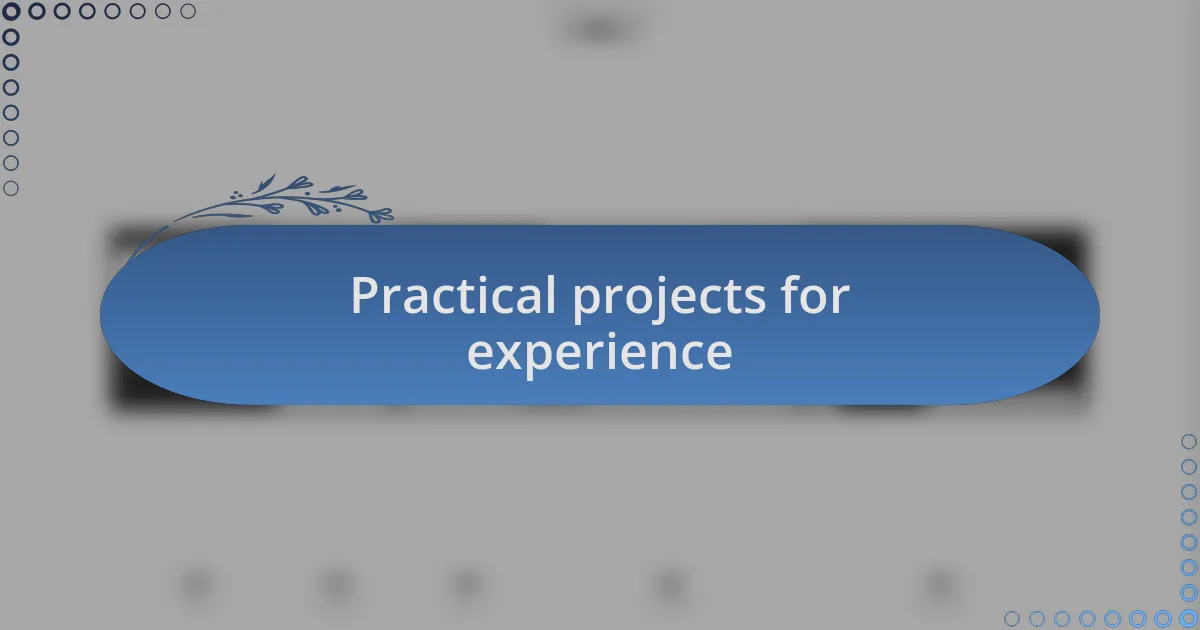
Practical projects for experience
Working on practical projects was a game-changer for me when learning React. One of the first things I did was to tackle a weather app, harnessing an API to pull real-time data. Watching the temperature change with each input was exhilarating; it was like bringing an idea to life right before my eyes. Have you ever experienced that moment when a project clicks? For me, it solidified the importance of working on real-world applications.
I also found that collaborating on open-source projects helped broaden my understanding of best practices. Joining a community and contributing to a React-based project exposed me to different coding styles and approaches. It wasn’t just about writing code; it was about learning how to communicate effectively with fellow developers. There’s something special about pooling talents to create something bigger than oneself, don’t you think? That collective effort pushed my skills to new heights.
Building a simple e-commerce site as a capstone project was particularly rewarding. I remembered the initial confusion with state management, but as I iterated on my design, everything began to click. Each hurdle was an opportunity for growth, and celebrating small wins, like successfully integrating the shopping cart feature, brought a sense of accomplishment I hadn’t anticipated. Do you remember your projects that made you feel like you could conquer the coding world? Those moments remind us why we invest time in learning.
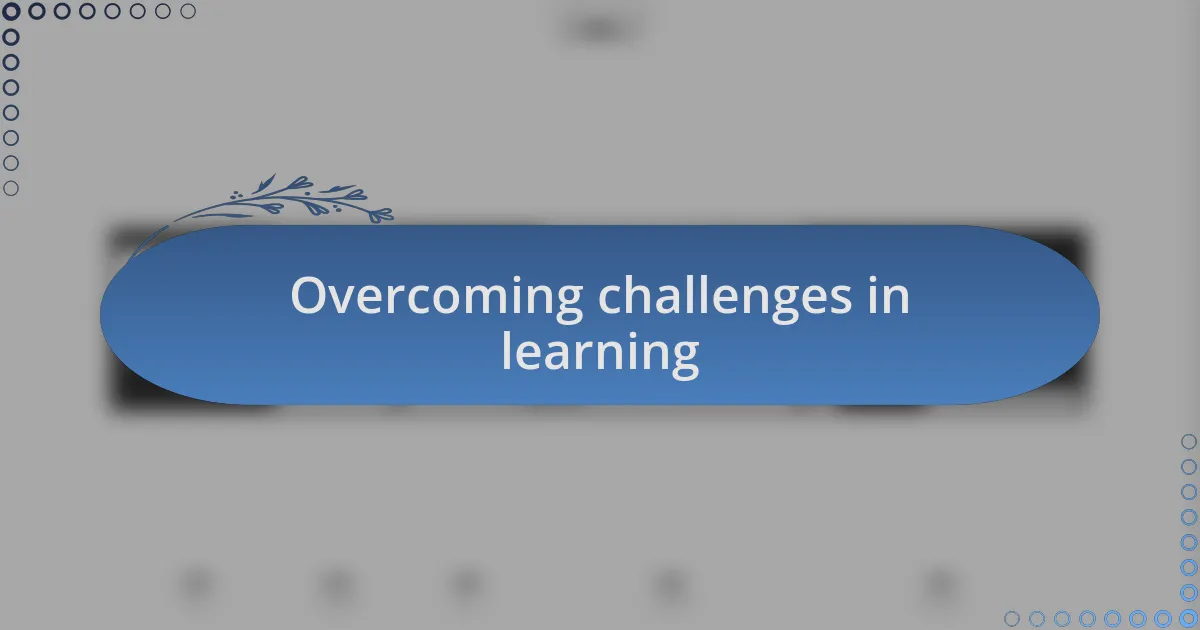
Overcoming challenges in learning
As I delved into learning React, one of the biggest hurdles was grappling with the concept of hooks. It felt like there were so many layers to peel back. I vividly remember staring at my screen, confused and frustrated, until one evening when a friendly coder in an online forum helped clarify their purpose. It was a reminder that reaching out for help can transform despair into understanding.
I also faced the challenge of managing time effectively while juggling multiple commitments. Finding the right balance was tricky, and there were nights I sacrificed sleep to practice coding. Yet, those late hours were often the most rewarding; each completed component sparked a sense of pride that overshadowed the fatigue. Have you ever felt that drive to push through, even when it’s tough? It’s incredible how passion can fuel persistence.
Another significant challenge was debugging—an unavoidable aspect of coding that can be daunting. I often found myself staring at errors, feeling defeated. However, I started viewing debugging as a puzzle to solve, rather than an obstacle. This shift in perspective made a world of difference. The thrill of uncovering the source of an error and fixing it sparked joy and taught me resilience. How about you? Have you turned your struggles into learning opportunities?
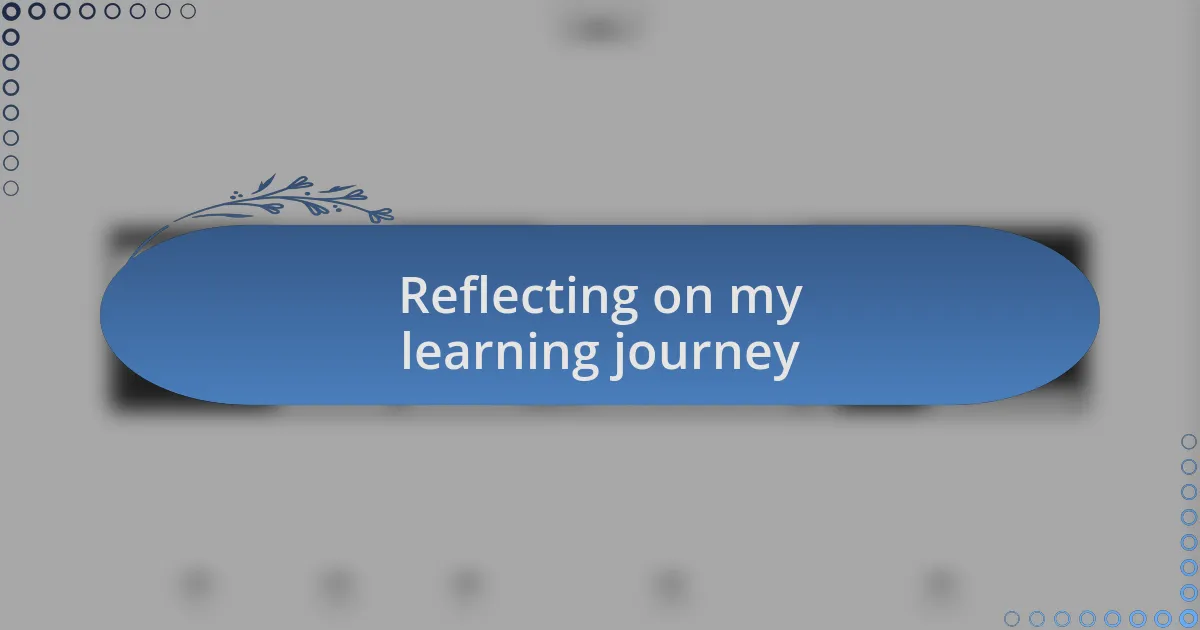
Reflecting on my learning journey
Reflecting on my learning journey, I often find myself reminiscing about the pivotal moments that shaped my understanding of React. One particularly eye-opening experience was when I built my first small application from scratch. I remember the exhilaration I felt; it was as if I had finally unlocked a door to a new world. That sense of achievement is something I cherish, as it reminded me that every small step counts in the learning process.
There were times I felt overwhelmed, especially when exploring the vast ecosystem surrounding React. The sheer volume of resources was intimidating. Yet, instead of letting that discourage me, I learned to embrace the journey. Focusing on one concept at a time helped me gain clarity and build confidence. Have you ever felt lost amidst an abundance of information? I realized that focusing on small victories was the key to navigating the chaotic terrain of web development.
With time, I began to appreciate the iterative nature of learning. Each iteration of my code wasn’t just about fixing errors but also about deepening my understanding. I vividly recall revisiting a project and completely revamping it after a few months. The contrast between my initial and revised approaches highlighted how much I had grown. Looking back, it’s evident to me that each struggle was a stepping stone, teaching me principles that went beyond just coding. Isn’t it fascinating how our experiences shape our learning paths?